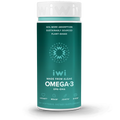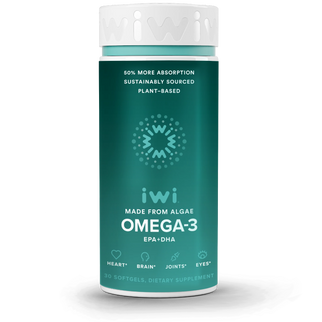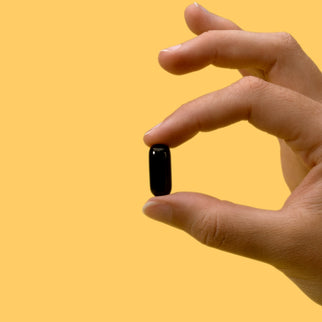You may hear some talk about the value of omega-3 supplements in their diet, but you are probably much less familiar with omega-7. This valuable nutrient is often overlooked in comparison with other fatty acids, but it may be just as valuable of an addition to any diet.
In this complete guide, you can gain a full picture of all the potential benefits of omega-7 and why you should include this nutrient in your diet.
What Is Omega-7?
Omega-7 is a monounsaturated fatty acid that gets its name because the unsaturation in the molecule happens seven carbon atoms away from the end of the carbon chain.
Because omega-7 shares a similar name and structure to omega-3, these two fatty acids are often compared. While technically omega-3s are polyunsaturated fatty acids instead of monounsaturated like omega-7, both of these nutrients fall solidly into the category of "healthy fats."
Like omega-3s, omega-7 fatty acids are naturally occurring in small amounts in the body, but they are also found in various fatty or oily foods.
Omega-7 is an important component of muscle, liver, and adipose tissues in the body. The most common form of omega-7 is palmitoleic acid.
This nutrient is often referred to as a “non-essential” fatty acid, meaning that the body theoretically produces enough. However, there may still be some valuable reasons for including it in your diet.
What Are the Benefits of Omega-7?
Despite being less well-known than other nutrients, omega-7 offers several possible benefits. Although more research is necessary to determine the full benefits of omega-7 and their validity, there are still some promising results.
The following are some of the exciting potential benefits of omega-7.
Supports Proper Insulin Sensitivity
Sensitivity is not always a bad thing, especially if you hear the term “insulin sensitivity.” Insulin sensitivity indicates that your body is responding to insulin properly, which helps support a healthy cardiovascular system.
Insulin is an important hormone in your body. Your pancreas produces insulin whenever you eat something, as the food is broken down into glucose, or sugar, and enters the bloodstream.
Insulin guides the glucose in the bloodstream, helping direct the sugar to your muscle, liver, and fat cells. At this point, they are used for energy or stored for later. Once all the glucose is directed, your pancreas stops producing insulin.
However, a consistently high sugar intake can stress this process, giving you almost consistently high insulin levels. Eventually, your body can become less sensitive to insulin production altogether.
After enough time, you can develop insulin resistance, which means your body does not respond appropriately to insulin. The most significant consequence of insulin resistance is that your fat, muscle, and liver cells do not correctly absorb and store the glucose, keeping your blood sugar levels high.
Fortunately, consuming omega-7s may help support your body’s natural insulin sensitivity.
The more regulated your body’s insulin sensitivity, the better it reacts to high insulin levels, helping you maintain healthy blood sugar levels.
Satisfies Your Hunger

In addition to supporting a healthy bodily response to the foods you eat, omega-7 may even help you support a healthy appetite and proper hunger signals. Omega-7 appears to be a powerful communicator between several important organs in the body.
Palmitoleic acid, a form of omega-7, has been shown to function as a lipokine, a type of hormone that communicates between adipose tissue in the body, also known as fat cells, and the metabolism.
This function is part of what makes it so effective in supporting your body’s insulin resistance. However, this function also features other benefits, like the ability to support healthy eating.
Operating as a lipokine, omega-7 supports the hormone that signals to your body that you are full. By doing so, this nutrient can help support healthy eating, as feeling full faster helps to prevent overeating. By promoting a healthy appetite, omega-7 helps support you in maintaining a healthy weight.
Supports Metabolism
The lipokine function of omega-7 still has a more important influence on the body. Omega-7 has also demonstrated promising results for its support for the body’s metabolic response, which may be related to its signaling abilities.
Metabolism is the process of turning foods into energy. Typically, foods are turned into sugar, which is used by your muscles and organs to support movement and healthy function.
A slow or inefficient metabolism reduces the body’s ability to turn foods into energy. When this happens, your body uses fewer nutrients as energy and turns them into body fat instead of energy.
Omega-7 helps support healthy metabolic function, influencing your body’s ability to burn fat and sugar. As a result, this nutrient demonstrates even more potential for influencing your body’s ability to support a healthy weight.
Omega-7 has also been shown to support oxygen consumption of energy-storing cells in the body, showing that it may promote the healthy performance of your cells in converting energy.
Helps Cholesterol Levels Already Within the Healthy Range
Like its relative omega-3, omega-7 has shown promising results in studies for its potential ability to maintain cholesterol levels already within the healthy range. In the body, there are two main types of cholesterol—high-density lipoprotein and low-density lipoprotein.
HDL is recognized as the “good” cholesterol as it helps to carry fats and triglycerides from the bloodstream to the liver so that they can be removed from the body. Meanwhile, LDL is recognized as the “bad” cholesterol as it can attach to these fats in the blood, instead causing buildup and blockage in the arteries.
Omega-7 fatty acids have demonstrated the potential to overall help maintain cholesterol levels already within the healthy range.
As a result, the nutrients can help support your heart and your cardiovascular health as a whole.
How Do I Get Omega-7?

Because it is less discussed as a beneficial nutrient in your diet, there is currently no recommended daily intake of omega-7. However, that doesn’t mean it is not valuable to include in your daily nutrient intake.
Palmitoleic acid is the most abundant form of omega-7, and you can find it in several common foods. Dietary sources of the nutrient include macadamia nuts and certain fish, like salmon and cod. Palmitoleic acid omega-7 is not incredibly difficult to obtain in your diet, but it is also not in a majority of the foods you eat.
Omega-7 can be tricky to obtain because it is not always clear what contains the nutrient and what does not. For example, some fish oil supplements contain it, and some do not, but it is rarely listed on labels either way.
If you are concerned about obtaining enough of this valuable nutrient, you can turn to a supplement that guarantees omega-7.
The most popular source of omega-7 in supplements is sea buckthorn oil. This plant provides omega-7 in the form of palmitoleic acid, in addition to some antioxidants.
However, if you want to obtain a considerable amount of omega-7 on top of your daily recommended intake of omega-3s, you can turn to iwi life.
iwi life’s algae-based omega-3 supplement contains 54 milligrams of naturally occurring omega-7, which means you can obtain plenty of this nutrient in just one soft gel each day.
With 54 mg of omega-7 fatty acids and a combined 250 mg of EPA and DHA omega-3 fatty acids, iwi life’s soft gels are a powerhouse of nutrition, and they are incredibly easy to include in your diet.
Get All of the Omega Fatty Acids You Need
Even though it may not be as famous as its cousin, omega-3, don't overlook the value that omega-7 can bring to your daily supplement routine. With the several potential benefits of omega-7, from supporting higher insulin sensitivity to promoting a healthy heart, there are plenty of reasons to include this nutrient in your daily nutrition.
Omega-7 is one of the many fatty acids included in iwi life’s omega-3 supplement. Combined with the abilities of omega-6s and DHA and EPA omega-3s, this powerful supplement allows you to enjoy many potential health benefits.
Try iwi life’s omega-3 supplement for yourself.
Sources:
Insulin Resistance: What It Is, Causes, Symptoms & Treatment | Cleveland Clinic
Fact Sheet on Palmitoleic Acid (Omega-7) | Cancer Association of South Africa (CANSA)


















